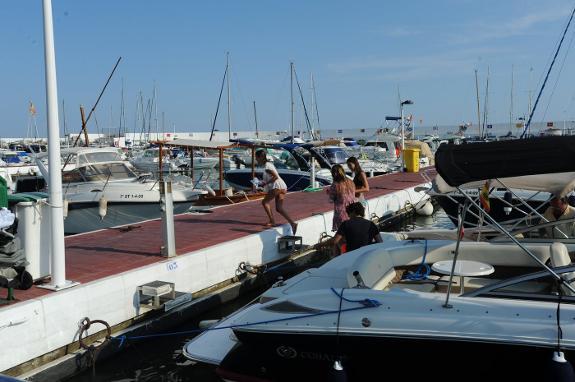

Sections
Highlight

Mónica Pérez
Friday, 5 October 2018, 10:02
Compartir
The nautical sector is expanding; it seems to have put behind it the most difficult period of the economic crisis and has now seen three years of continual growth.
"The figures are still quite low, but you have to bear in mind that we're starting from zero because the sector disappeared altogether during the crisis," said Carlos Sanlorenzo, the general secretary of the National Association of Nautical Companies(Anem).
This growth reflects a changing trend in consumption, which has readjusted the market. The hire of leisure yachts and, at the same time, the introduction of the "Airbnb formula" at sea, has become the driving force behind a sector which has now awoken from the coma it was left in by the crisis.
"During the crisis the sector practically vanished. It wasn't like the motoring sector, for example, where the figures went down one or two points. It was devastating for us," stressed Sanlorenzo last week. After three consecutive years of growth, he added, although it is relatively minor, "we can say that we are now in a situation of consolidation".
To be specific, the nautical market has seen 4,785 new leisure yacht registrations between January and August this year, which is an increase of 4.3 per cent on the same period in 2017, when there were 4,589.
Today, chartering (in other words rental, or hire) represents 30.33 per cent of the market, and there were 1,392 new registrations and a growth of 15.4 per cent in August alone, according to Anem. The number of jetskis increased most during the first eight months of this year, as 14.4 per cent more were registered, although motor yachts are still the most in demand in Spain and account for 42.5 per cent of the nautical market.
Those in the sector recognise unambiguously that "one of the main components of the recovery of the sector has been chartering, due to the changing trend in consumer habits," explained Sanlorenzo.
This readjustment of the market has brought with it the introduction of the Airbnb phenomenon for yachts. The collaborative economy is here to stay. Few sectors are ignoring this new business model, which is now becoming familiar in the nautical world and has resulted in the appearance of internet platforms for yacht hire such as Nautal, Click&Boat and Samboat, which are doing well.
The yacht rental market, according to sources in the sector, is growing at an average of between 15 and 20 per cent a year, generating a volume of business in Spain of around 300 million euros. This scenario is attracting more companies, while individuals are starting to discover, as occurred with housing a few years ago, how much money they could make from sharing their yacht, which they only use for a few days a year.
A survey carried out by Nautal, a portal where companies and individuals offer their yachts for rent, shows that in general the owners use them for an average of 13 days a year. If in addition to this you think of the cost each year in terms of depreciation, berthing, annual lifting, maintenance, repair and insurance, the cost of owning a 10-metre yacht, for example, can be around 10,000 to 15,000 euros a year.
How much does it cost to rent a yacht? A 10-metre sailing yacht for one week works out at around 700 euros on average in low season and 1,500 in high season, according to the Nautal report. This means that renting out a private yacht becomes an excellent opportunity to reduce costs, as confirmed by another of the most popular sites, Click&Boat.
The question that has to be asked now, though, is whether this business model will generate the same problems as tourist accommodation on land. In this case there are no problems about disturbing neighbours, but equally the business has to comply with its fiscal and administrative obligations. The nautical sector is clear about this: the rules of the game have to be respected, and for that reason this type of activity has to be closely monitored.
"We see this type of business as a positive thing, as long as people respect the rules. We cannot accept any type of illegal renting disguised as collaborative consumption," insisted Carlos Sanlorenzo.
He recognises the attraction of this type of business in the nautical tourism sector, but warns that illegality cannot be permitted. "If it is a rental, it has to comply with all the administrative, fiscal and employment requirements. As long as it does that, then as an initiative which boosts our sector, it is welcome," he said.
More berths occupied
The summer which has just come to an end has shown that marinas in Andalucía continued to attract business. On average, 90 per cent of berths were occupied in the ports that form part of the Marinas de Andalucía Association, and in some specific cases such as Marbella, the figures have been even better.
The director of Marbella's Virgen del Carmen marina, Javier Mejías, says that not only was it 100 per cent full, but there was even a waiting list for berths. At Puerto Banús, the CEO Juan Núñez Insausti said a few days ago that there has been an increase in occupancy of berths for the biggest and most luxurious yachts.
"We have seen a return of people who truly love the sea. One of the challenges for this sector is client loyalty. We have come from a period, between 2000 and 2007, when buying a yacht had nothing to do with a passion for navigating, and everything to do with other factors like snobbishness, and we suffered because of that. We need to excite people, make them see that there are many ways of enjoying the sea, not just by buying a yacht," said Carlos Sanlorenzo.
Publicidad
Publicidad
Publicidad
Publicidad
Reporta un error en esta noticia
Necesitas ser suscriptor para poder votar.